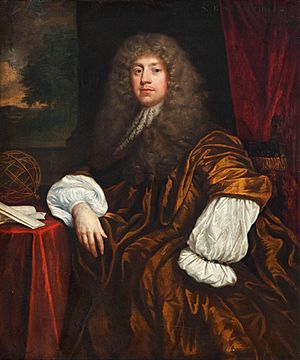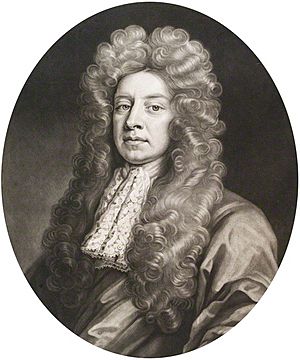Robert Southwell (diplomat) facts for kids
Quick facts for kids
Robert Southwell
|
|
|---|---|

Portrait by Godfrey Kneller
|
|
| 9th President of the Royal Society | |
| In office 1690–1695 |
|
| Preceded by | Thomas Herbert |
| Succeeded by | Charles Montagu |
| Personal details | |
| Born | 31 December 1635 County Cork, Ireland |
| Died | 11 September 1702 (aged 66) King's Weston House, Bristol |
| Resting place | Henbury |
| Spouse |
Elizabeth Dering
(m. 1664; died 1682) |
| Children | Edward Southwell Sr. 5 others |
| Parents |
|
| Alma mater | University of Oxford (BA) |
Sir Robert Southwell (born December 31, 1635 – died September 11, 1702) was an important person in both Irish and English politics. He was a diplomat, which means he represented his country in other nations. He also served as the Secretary of State for Ireland and was the President of the Royal Society, a famous group for scientists, starting in 1690.
Contents
Early Life and Education
Robert Southwell was born in County Cork, Ireland, on December 31, 1635. His father, also named Robert Southwell, worked as a customs official. This meant he helped collect taxes on goods coming into the country.
During a time of conflict called the English Civil War, Robert's family supported the King. This made things difficult for them. Because of this, young Robert was sent to school in England. He studied at Queen's College, Oxford, and earned his degree in 1655.
After finishing his studies, Robert traveled around Europe from 1659 to 1661. He met many smart thinkers and scientists of his time. In 1662, he became a Fellow of the Royal Society, showing he was interested in science and learning.
Working for the Government
When Robert returned to Ireland, his father wanted him to find a job there. In 1664, he became a secretary for the Commission of Prizes. This group dealt with valuable items captured during wars at sea.
Soon after, he married Elizabeth Dering. Her family gave them money, which helped Robert buy a special job. He became one of the four clerks for the Privy Council. This was a group of advisors to the King.
Robert was very good at languages, which made him perfect for diplomatic work. In 1665, he was sent to Portugal as an ambassador. He even received a special honor and became "Sir" Robert before he left. He helped make peace between Spain and Portugal. He returned to England but was sent back to Portugal for another year.
In 1671, he became the ambassador to Brussels. When he came back to England, he was elected to the English Parliament in 1673. This meant he helped make laws for the country. He also took on other important roles, like helping his father as the Vice-Admiral of Munster.
Later Career and Legacy
After King William and Queen Mary came to power, Sir Robert Southwell went with King William to Ireland. He served as William's main secretary. This was during a time when the previous King, James II, was trying to get his kingdom back.
In December 1690, Sir Robert was chosen as the President of the Royal Society. He was re-elected to this important position every year until 1695. He also worked as a Customs Commissioner, helping to manage taxes on goods.
Sir Robert Southwell passed away at his home, King's Weston House, near Bristol, on September 11, 1702. He was buried nearby. Even though he lived in England, he remembered his Irish roots. He helped set up special homes for people in need in his hometown of Kinsale, Ireland.
Family Life
On January 26, 1664, Robert Southwell married Elizabeth Dering. They had several children. Their son, Edward Southwell, became his heir. They also had four daughters named Helena, Elizabeth, Mary, and Catherine.
See also
 | Precious Adams |
 | Lauren Anderson |
 | Janet Collins |


